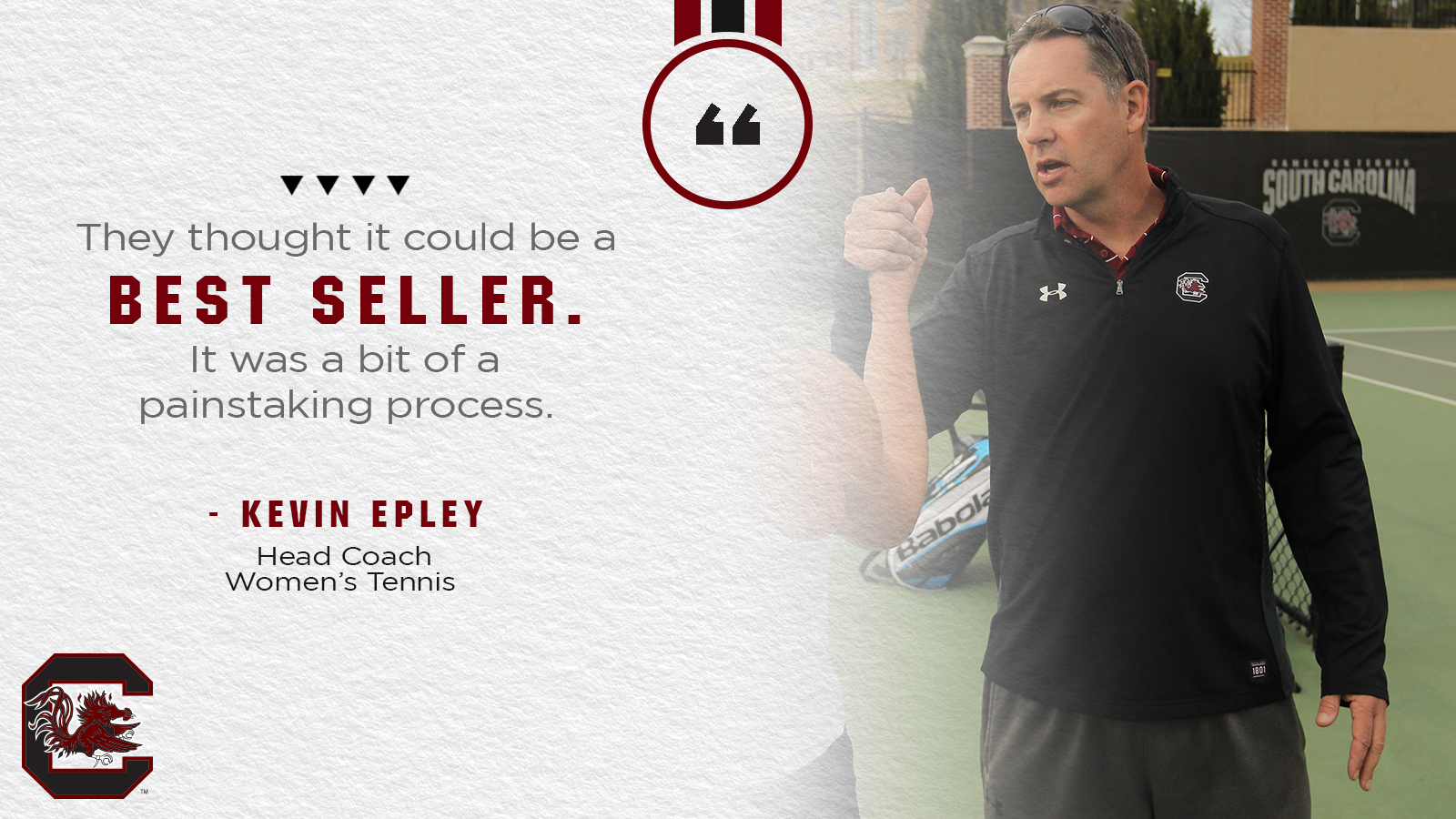
Kevin Epley Shares His Claim to Fame Outside of Tennis
Who doesn’t want to have a “claim to fame?” South Carolina women’s tennis coach Kevin Epley has carved out an outstanding career in his field and was mentored by hall of famer Billie Jean King, but the 2019 ITA National Coach of the Year also had a small part in the publishing of a best-selling novel in Tom Clancy’s first book, The Hunt for the Red October (1984).
“I edited the last line of one of the chapters,” Epley said with a grin. “I was in the seventh grade, and I was coming home every day from school, and my dad had the book (draft) open on his desk, and I said, ‘Dad, wouldn’t it be better if it was written like this?’ So, we changed it.
“I have not seen one royalty from that. I’m still waiting. It’s funny, I don’t really think about it a lot, but it’s just one of those neat childhood memories.”
Epley’s father, Tom, was the press director at the Naval Institute Press in downtown Annapolis (MD), which previously had been publishing strictly non-fiction.
“It was Navy manuals, technical books, military history and that kind of stuff,” Epley said. “Around 1983, my dad and the head editor (Debbie Grosvenor) had the book come to them after it had gone through quite a few New York publishing houses and was turned down. Tom Clancy was an unpublished author at that time. He had written the book in about four months.
“My dad and Debbie made a campaign to their commander that they should take on a fiction novel and make an exception. It was a big hurdle for them to jump, but they thought it could be a best seller. The military theme gave them a reason. Tom Clancy is very technical and detailed, and he was very groundbreaking in that capacity. He had incredible knowledge of technical military elements. So, they took it on, and they began to edit the book. It was a bit of a painstaking process. They went through every line. They spent a lot of time arguing about what to take out and things like that. It was a fascinating process.”
“If I wrote a book, it would be a tennis thing, mostly non-fiction.”
It didn’t take long for the book to take off.
“Right after it was published, there was a picture in one of the national magazine publications of (President) Ronald Reagan at his desk with the book and he mentioned that he really enjoyed it,” Epley recalled. “That really gave it a boost and it shot up to number one on the best seller list. It was an amazing thing for this publishing house’s first (fiction) book. They had bought the rights to the book for something like $5,000. Tom Clancy was in my dad’s office all the time, and I got to hang out there with them quite a bit at the time as a kid. It was a really neat time. It was really a great effort for my dad and Debbie, and it was a big moment for the (Naval Institute) Press. Obviously, it was huge for Clancy.
“I remember how they were designing the cover and how they would painstakingly go through everything in this little office. I think we ended up getting a couple hundred first edition signed books. I think I have one left somewhere.”
Although Epley didn’t “contribute” to any more other best-selling novels, there was more excitement on the way.
“After that book, they discovered Stephen Coonts, and his first book (Flight of the Intruder) went to number one on the best seller list,” Epley said. “Both of those books became movies. My dad actually ghost-wrote around three chapters of that book. We later had these t-shirts made with pictures of the books, and on the back, it read, ‘Batting 1,000.'”
Epley’s father later ran the auction for the movie rights for The Hunt for the Red October.
“I remember my dad taking in all the calls at our house while we’re sitting on our back deck, grilling cheeseburgers,” Epley said. “I don’t remember how much it was, but my dad was so thrilled. Then it became a hit movie.”
After the success of Clancy’s first book, the author became coveted by much larger publishing companies.
“I know my dad was disappointed when he (Clancy) left, but of course he got offered a lot of money, and Naval Institute Press couldn’t do that.”
Even with his claim to fame, Epley did not desire to follow in his father’s footsteps.
“I never wanted to be an editor,” Epley said. “My initial major was creative writing. Later I decided I liked history and philosophy. When I was young, I used to write all the time. My dad wanted me to get more into it. Now, if I wrote a book, it would be a tennis thing, mostly non-fiction.
“I used to read a lot as a kid. I don’t read a lot of fiction anymore. I like to read books on philosophy and economics. I haven’t found anyone who is as passionate about that stuff as me. Weird, huh?”












